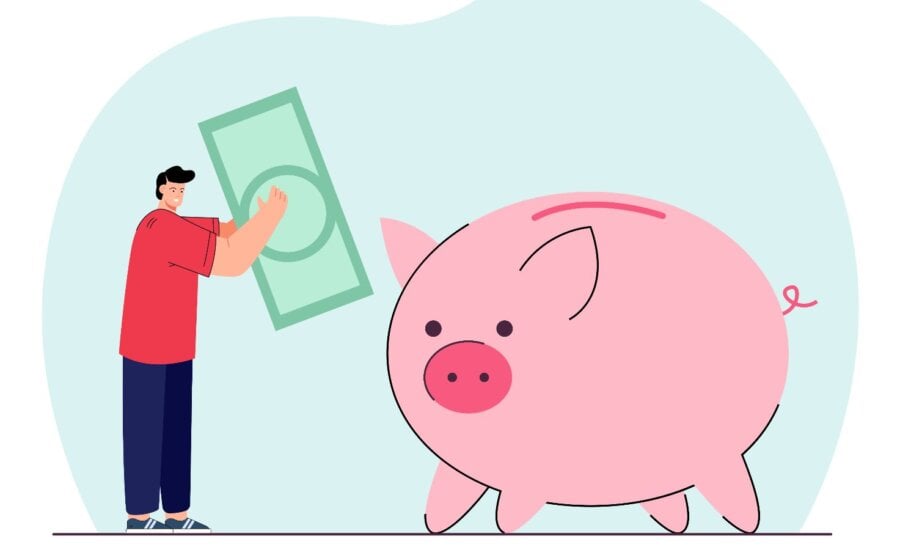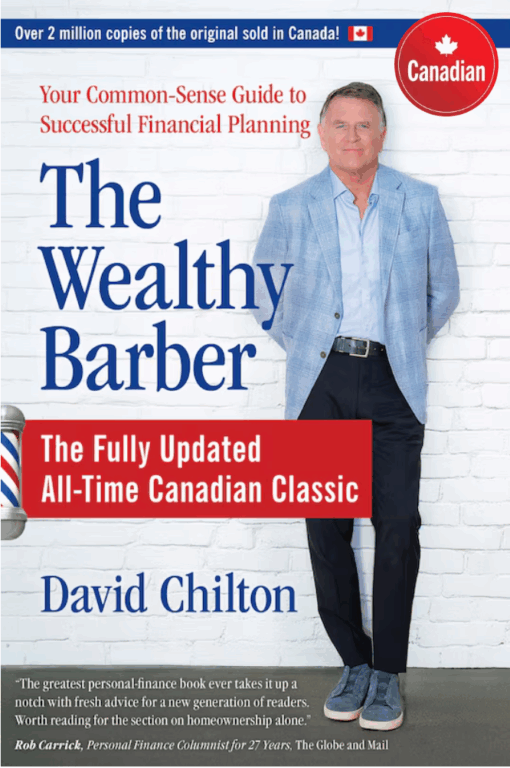The return of The Wealthy Barber
David Chilton’s The Wealthy Barber returns for 2025, updated for today’s costs, new investment tools, and a new generation learning to “pay yourself first.”
Advertisement
David Chilton’s The Wealthy Barber returns for 2025, updated for today’s costs, new investment tools, and a new generation learning to “pay yourself first.”

The original version of The Wealthy Barber was released in 1989, and has since become one of the best-selling books of all-time in Canada with over 2 million copies sold. Its cultural impact rivals that of Canadian literary classics like Margaret Atwood’s The Handmaid’s Tale and L.M. Montgomery’s Anne of Green Gables.
Personal finance books rarely capture mass appeal, but author David Chilton managed it through the relatable, conversational lessons from the wealthy Mr. White to mild-mannered Roy in his Sarnia barber shop. The sequel, The Wealthy Barber Returns, took a different approach in its 2011 release. Instead of his original characters, Chilton doled out advice by sharing his personal perspectives on money.
The updated 2025 version of The Wealthy Barber was released on November 4 exclusively in Indigo stores and independent bookshops across the country. It has been completely re-written to include new realities of Canadian wealth building, like the Home Buyer’s Plan, tax-free savings accounts (TFSAs), and first home savings accounts (FHSAs). These additional account choices, along with new investment vehicles and the high cost of living, make it even more difficult to decide how best to pay yourself first. This is what makes the re-write even more relevant for a new generation of Canadians.

I spoke with David Chilton about the new edition. He said his motivation was to address the challenges that young people face today, from rising costs to new financial products. “The original book didn’t include ETFs or index funds,” he noted, “which are now common investment tools in Canada.”
I read the original book as a teenager, and while many Baby Boomers and older Gen-Xers may wonder if this re-write is for them, it is probably not. But it is for their kids and grandkids. According to Chilton, it targets “young adults in their 20s, 30s, and 40s, emphasizing passive investment strategies and basic financial principles like keeping costs low and paying oneself first.”
The broad appeal of the original book is probably due to the humour and relatable storytelling that simplifies complex financial topics. This helps readers feel less intimidated and more empowered. So, if you consider yourself less financially literate, the lessons will be easy to digest.
Chilton highlights the high cost of living, particularly housing, as making it tough for young people today to commit to regular savings. There is also the pressure of social media to spend on things that may feel like necessities but are not.
Saving has to be a necessity too, however, before making other financial commitments. In fact, when I asked Chilton for his most timeless lesson that remains relevant today, “pay yourself first” topped his list. He also highlighted the chapter in the updated book on saving savvy, which provides tips for managing daily finances to make sure there is money to set aside for the future. After all, you cannot invest if you cannot save.
Chilton expressed frustration with how much young people spend on cars despite the challenges of home ownership and rising living costs. But he gives them credit for recognizing the benefits of low-cost investment strategies, with younger generations becoming more fee-sensitive and aware of the impact of investment fees on their retirement accumulation.
One of the key messages from The Wealthy Barber is to “save and invest 10 to 15 per cent of all you make by paying yourself first.” For those who remember the 1989 original but regret not taking that advice, the good news is that it is never too late. “The best time to plant an oak tree was 20 years ago,” writes Chilton. “The second-best time is now.”
The Wealthy Barber update touches on budgeting, investing, real estate, wills, and life insurance, among other topics. The result is a series of personal finance lessons weaved into a series of fables.
Chilton has complemented the book with his new The Wealthy Barber podcast, featuring Canadian personal finance voices. He notes that “it has become a top business podcast in Canada, without monetization, while focusing on providing valuable financial information to a wide audience.”
The concepts in the book are timeless messages that stand the test of time, but the update makes it even more relevant. The appeal of the Chilton brand is that he is prescriptive with his advice while being genuine in his intentions. In a world where many young people learn questionable financial lessons from biased finfluencers, The Wealthy Barber is as good a source as any to guide a young person on their path to real financial independence.
Share this article Share on Facebook Share on Twitter Share on Linkedin Share on Reddit Share on Email
I really enjoyed the updates in David Chilton’s new version of The Wealthy Barber! It’s great to see how he addresses modern financial challenges. Paying yourself first is such an important concept, especially with today’s rising costs. Looking forward to more insights!
My dad gave me his original book when I was in post secondary school and those lessons have served me well. My spouse and I have been able to retire early (late 50s) and are financially secure, all thanks to the basic saving, investing and estate related information from that 1989 book.
I’m definitely going to take a look at this updated version and will most likely carry on the tradition and get it for my daughters. Thanks Mr. Chilton!
Geez, do I feel old now. LOL. I started my working career in 1989. With the introduction and help of a financial advisor, who recommended “The Wealthy Barber”, my girlfriend and future wife, read it and adopted the “pay yourself first” mantra to this day. We are extremely fortunate and grateful to have received the advice of this advisor, and a few others, we have since retired at 52 and 55 respectively. This advice was key, but I think what makes even more special to us, is that we embraced it right from the beginning. Sure, there were bumps and bruises along the way, but the fundamental lessons are something we’re very proud to have learned. I firmly believed this book, advice and life lessons set us up for success. Yes many decisions and changes were made along the way. Some good, some great, some bad, and despite those blips, we made more good decisions than bad and as we learned more, it became very clear at the beginning this was definitely the right path for us.
Our children, who are now 31, 28, and 25 were also given David’s book many years ago, as a means for us to give them the best starting out advice we can as parents. It gives us peace of mind and fulfilment as parents that we’re doing the right things to help our children and now, a new grandson, to help carve out their own futures with rock solid advice.
Best regards,
Dave Martignago
I too bought the wealthy Barber in 1990 .It paid for it self 100 times over. I till use those practices today. I’m buying he new version today.
Read this way back in, what 1994 or 95 I think, followed his be an owner and not a loaner, as well as the millionaire next door. I was young and poor, and after 30 years of hard work I am no longer young…